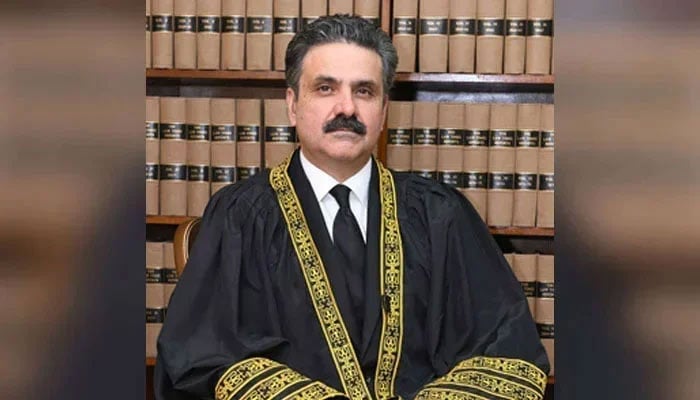President Zardari approves Justice Yahya Afridi's appointment as next CJP
Justice Afridi to serve as Pakistan's top judge for three years starting from Oct 26
ISLAMABAD: President Asif Ali Zardari has appointed Justice Yahya Afridi as the next Chief Justice of Pakistan (CJP), succeeding the current CJP, Qazi Faez Isa.
Justice Afridi will serve a fixed three-year term starting October 26, according to a statement issued from the Aiwan-e-Sadar on Wednesday morning.
He will be Pakistan's 30th chief justice.
The appointment was made in accordance with Articles 175A(3), 177, and 179 of the Constitution, with Justice Afridi set to take the oath of office on October 26, the statement added.
The nomination of the top judge was made by the Special Parliamentary Committee on Tuesday night, constituted for the first time in the country’s history for the appointment of the CJP, with a two-thirds majority.
The committee sent its recommendation for Yahya Afridi to Prime Minister Shehbaz Sharif, which was later approved by the president.
This method of appointing the country's top judge has been adopted for the first time after the enactment of the contentious 26th Constitutional Amendment Bill, which suggests that the CJP will be “appointed on the recommendation of the Special Parliamentary Committee from amongst the three most senior judges of Supreme Court” with two-thirds majority.
The committee has participation from all the political parties in parliament, including senators and members of National Assembly on both the opposition and treasury benches.
However, the key opposition party, Pakistan Tehreek-e-Insaf (PTI), opted not to participate in the Special Parliamentary Committee meetings.
The ruling coalition last week successfully pushed through the highly contentious judicial reforms through the Parliament via a two-thirds majority with 225 and 65 votes in the lower and upper house, respectively.
The constitutional tweaks were also opposed by the PTI, which has pledged to revoke the legislation whenever it returned to power in the Centre, terming it an attack on the “independence” of judiciary.
The party has also announced rejected the nomination of Justice Afridi as the next CJP, vowing to launch a protest movement against the Special Parliamentary Committee’s decision.
Who is Justice Yahya Afridi?
Justice Afridi was born in Dera Ismail Khan on 23rd January 1965. He belongs to the Adam Khel section of the Afridi tribe located in the Kohat Frontier Region and is a resident of Village Babari Banda, District Kohat. He belongs to a family steeped in a tradition of public service.
He received his early education at Aitchison College, Lahore. He went on to earn his Bachelor of Arts in Political Science and Economics from Government College Lahore and later obtained his Masters of Arts degree in Economics from Punjab University, Lahore.
After being awarded a Commonwealth Scholarship, Justice Afridi completed his LLM from Jesus College at the University of Cambridge. He was subsequently selected for a scholarship program for Young Commonwealth Lawyers at the Institute of Legal Studies in London.
He started his private practice in Peshawar and lectured at Khyber Law College, University of Peshawar where he taught International Law, Labour Law and Administrative Law.
He was enrolled as an advocate of the High Court in 1990 and as an advocate of the Supreme Court in 2004. He served as an Assistant Advocate General for the province of Khyber Pakhtunkhwa and as a Federal Counsel for the Government of Pakistan while in practice.
Afridi was elevated to the Bench of the Peshawar High Court as Additional Judge in 2010 and was confirmed as a Judge of the Peshawar High Court on 15th March 2012.
Justice Afridi became the first judge from the Federally Administered Tribal Area to assume the office of the Chief Justice of the Peshawar High Court when he took oath on 30th December 2016. He served in that office until his elevation as a Judge of the Supreme Court of Pakistan on 28th June 2018.
-
Security forces gun down 30 terrorists in multiple IBOs in KP: ISPR
-
MQM-P calls for new province in Sindh
-
US report validates Pakistan military edge over India: PM
-
Banned TTP poses serious threat to Pakistan security: UNSC panel
-
CM Afridi clarifies remarks on by-poll after ECP requests army deployment
-
Dubai sees 3.2m Pakistani passengers in 2025 as airport sets new milestone
-
Security forces kill 23 Indian proxy terrorists in KP's Kurram
-
Pakistan to construct island to boost oil exploration: report












